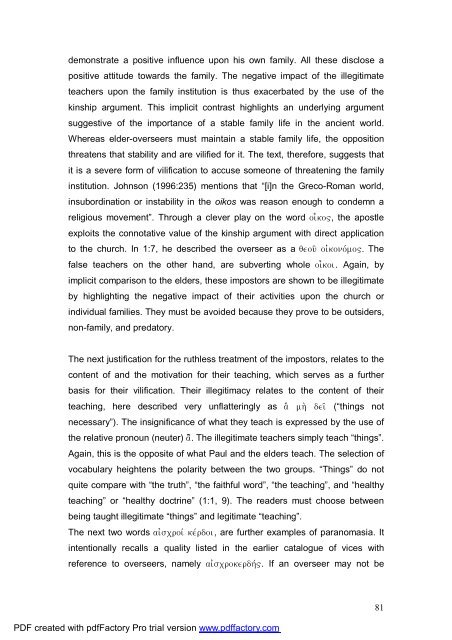A Text centred rhetorical analysis of Paul's Letter to Titus
A Text centred rhetorical analysis of Paul's Letter to Titus
A Text centred rhetorical analysis of Paul's Letter to Titus
You also want an ePaper? Increase the reach of your titles
YUMPU automatically turns print PDFs into web optimized ePapers that Google loves.
demonstrate a positive influence upon his own family. All these disclose a<br />
positive attitude <strong>to</strong>wards the family. The negative impact <strong>of</strong> the illegitimate<br />
teachers upon the family institution is thus exacerbated by the use <strong>of</strong> the<br />
kinship argument. This implicit contrast highlights an underlying argument<br />
suggestive <strong>of</strong> the importance <strong>of</strong> a stable family life in the ancient world.<br />
Whereas elder-overseers must maintain a stable family life, the opposition<br />
threatens that stability and are vilified for it. The text, therefore, suggests that<br />
it is a severe form <strong>of</strong> vilification <strong>to</strong> accuse someone <strong>of</strong> threatening the family<br />
institution. Johnson (1996:235) mentions that “[i]n the Greco-Roman world,<br />
insubordination or instability in the oikos was reason enough <strong>to</strong> condemn a<br />
religious movement”. Through a clever play on the word oi\ko~, the apostle<br />
exploits the connotative value <strong>of</strong> the kinship argument with direct application<br />
<strong>to</strong> the church. In 1:7, he described the overseer as a qeou' oijkonovmo~. The<br />
false teachers on the other hand, are subverting whole oi\koi. Again, by<br />
implicit comparison <strong>to</strong> the elders, these impos<strong>to</strong>rs are shown <strong>to</strong> be illegitimate<br />
by highlighting the negative impact <strong>of</strong> their activities upon the church or<br />
individual families. They must be avoided because they prove <strong>to</strong> be outsiders,<br />
non-family, and preda<strong>to</strong>ry.<br />
The next justification for the ruthless treatment <strong>of</strong> the impos<strong>to</strong>rs, relates <strong>to</strong> the<br />
content <strong>of</strong> and the motivation for their teaching, which serves as a further<br />
basis for their vilification. Their illegitimacy relates <strong>to</strong> the content <strong>of</strong> their<br />
teaching, here described very unflatteringly as a} mh; dei' (“things not<br />
necessary”). The insignificance <strong>of</strong> what they teach is expressed by the use <strong>of</strong><br />
the relative pronoun (neuter) a}{. The illegitimate teachers simply teach “things”.<br />
Again, this is the opposite <strong>of</strong> what Paul and the elders teach. The selection <strong>of</strong><br />
vocabulary heightens the polarity between the two groups. “Things” do not<br />
quite compare with “the truth”, “the faithful word”, “the teaching”, and “healthy<br />
teaching” or “healthy doctrine” (1:1, 9). The readers must choose between<br />
being taught illegitimate “things” and legitimate “teaching”.<br />
The next two words aijscroiv kevrdoi, are further examples <strong>of</strong> paranomasia. It<br />
intentionally recalls a quality listed in the earlier catalogue <strong>of</strong> vices with<br />
reference <strong>to</strong> overseers, namely aijscrokerdhv~. If an overseer may not be<br />
PDF created with pdfFac<strong>to</strong>ry Pro trial version www.pdffac<strong>to</strong>ry.com<br />
81

















